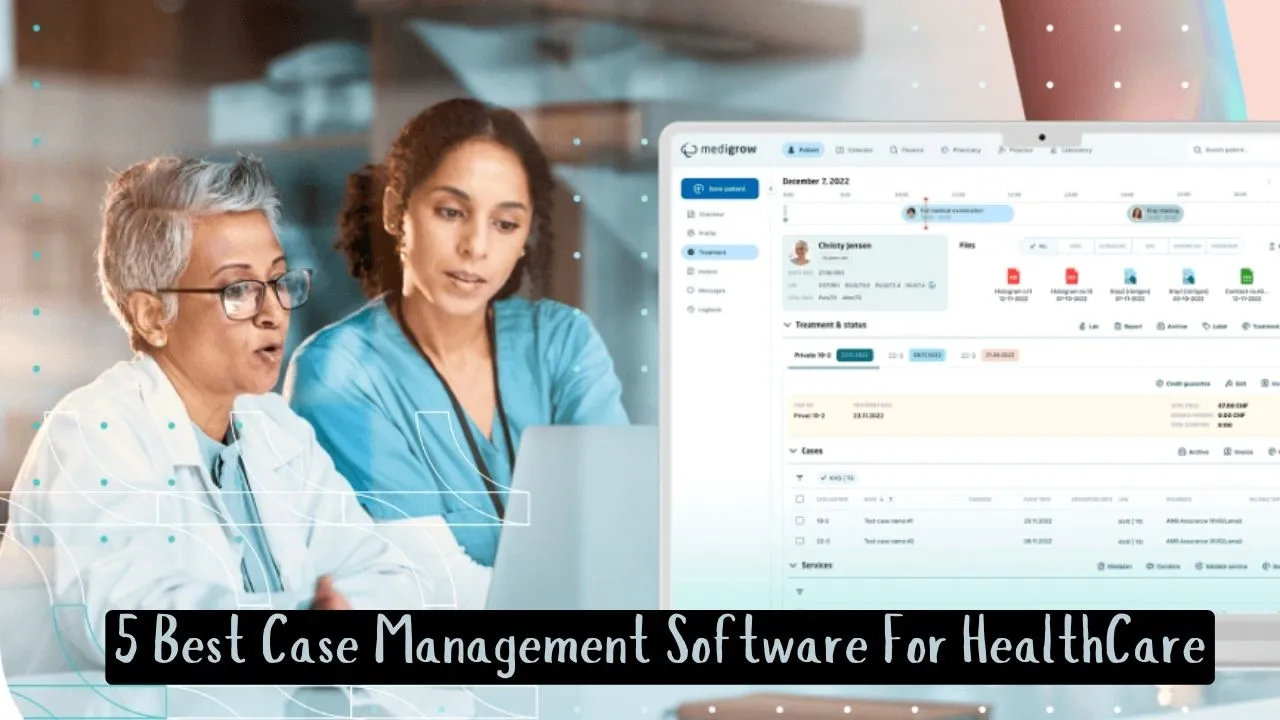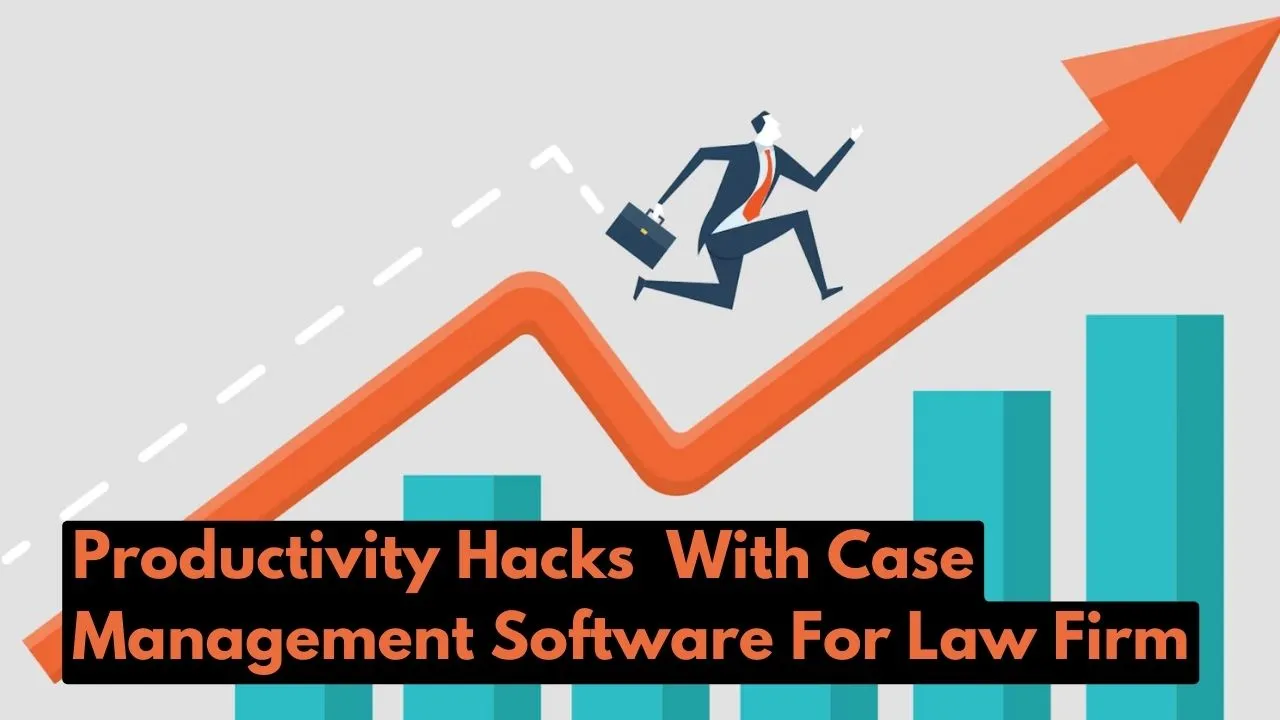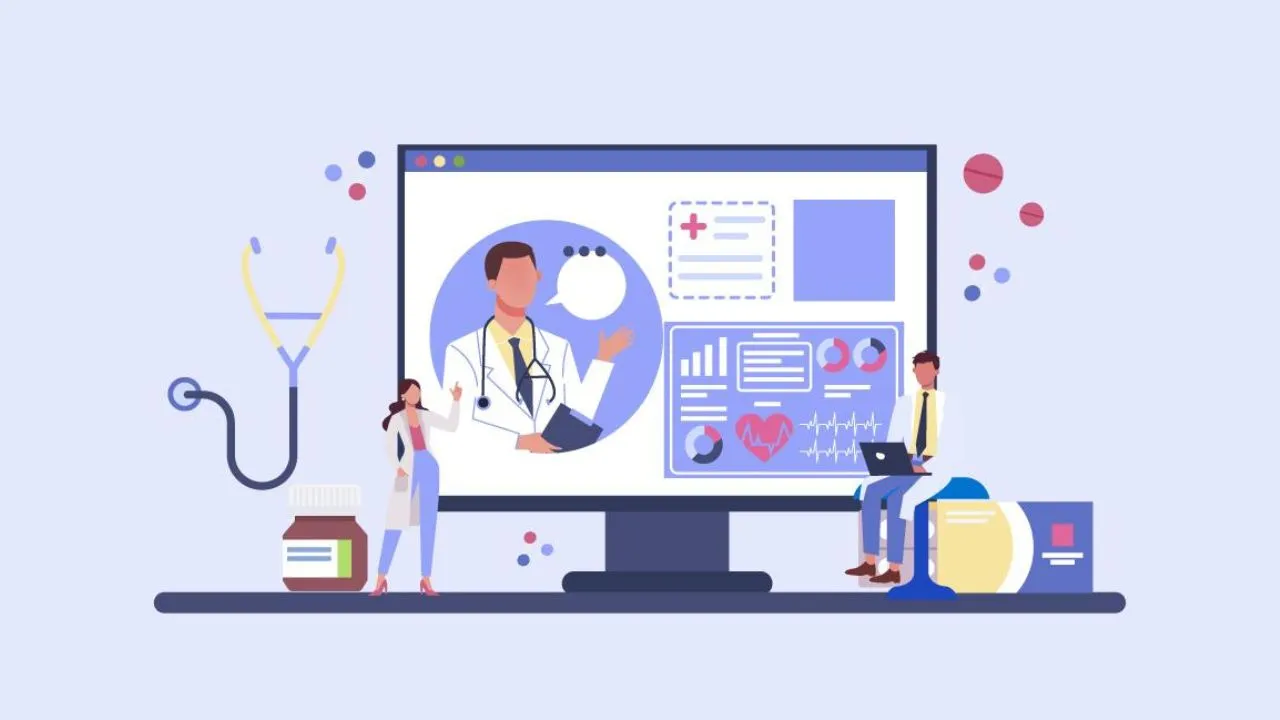Case management software in healthcare is an essential software system that is designed to facilitate and improve the management of patient care.
This software supports healthcare providers by facilitating the organization, tracking, and management of patient information and treatment plans.
It integrates various functionalities that help in handling complex medical cases more efficiently, ensuring that patients receive the best possible care.
Case management software for healthcare and medical cases streamlines patient care by centralizing data, improving coordination among care teams, and ensuring compliance with regulations. It enhances patient outcomes through efficient data management, reduces administrative burdens, and provides robust reporting and analytics for better decision-making. Overall, it leads to more personalized, timely, and effective patient care.
Here, we will explore 5 best case management software for healthcare and medical cases, their features, benefits, who should be using, and more…
Best Case Management Software For HealthCare & Medical Cases
Selecting the best case management software for healthcare depends on specific needs, budget, and the scale of the healthcare organization.
However, several well-regarded options in the market are known for their comprehensive features, user-friendly interfaces, and robust support.
Here are some of the best case management software options for healthcare:
1️⃣ Kissflow
Kissflow is a low-code and no-code platform that allows organizations to automate processes, build applications, and manage workflows efficiently.
For healthcare case management, Kissflow can be particularly useful due to its flexibility and ease of customization.
By leveraging Kissflow, these healthcare and medical organizations can significantly enhance operational efficiency, ensure regulatory compliance, and improve overall patient care and administrative workflows.
Key Features for Healthcare Case Management Software
✔️ Customizable Workflows: Design and automate workflows tailored to specific healthcare processes, ensuring that each case follows the necessary steps from patient intake to discharge.
✔️ Case Tracking and Management: Track patient cases from start to finish, ensuring that all necessary actions are taken in a timely manner and all patient information is up-to-date.
✔️ Data Integration: Integrate with other healthcare systems like Electronic Health Records (EHR), ensuring seamless data flow and minimizing the need for manual data entry.
✔️ Collaboration Tools: Enable healthcare professionals to collaborate on cases, share notes, and update patient information in real-time, improving coordination and communication.
✔️ Form Builder: Create custom forms to capture patient information, assessments, and other necessary data points, streamlining data collection and improving accuracy.
✔️ Reporting and Analytics: Generate detailed reports and analytics on patient cases, helping to identify trends, monitor performance, and make informed decisions.
✔️ Compliance and Security: Ensure that all patient data is handled in compliance with healthcare regulations like HIPAA, providing robust security features to protect sensitive information.
Use Cases in Healthcare
✔️ Patient Intake Management: Facilitate the patient intake process, ensuring that all necessary information is captured accurately and efficiently.
✔️ Chronic Disease Management: Manage cases for chronic disease patients, tracking treatment plans, follow-up appointments, and patient progress.
✔️ Discharge Planning: Automate discharge planning workflows, ensuring that all necessary steps are completed before a patient is discharged.
✔️ Incident Reporting: Facilitate incident reporting and management, ensuring that all incidents are documented and addressed promptly.
Who Should Be Using Kissflow?
✔️ Hospitals and Clinics: To manage patient admission processes, appointment scheduling, and discharge procedures efficiently.
✔️ Healthcare Administrators: For streamlining administrative workflows such as billing, insurance claims processing, and compliance tracking.
✔️ Medical Research Facilities: To oversee project management for clinical trials, research documentation, and data collection.
✔️ HR Departments in Healthcare: For managing recruitment, staff onboarding, leave requests, and performance evaluations of medical personnel.
✔️ IT Departments in Healthcare: To handle IT service requests, system maintenance workflows, and cybersecurity protocols.
✔️ Pharmaceutical Companies: To automate regulatory compliance processes, manage drug approval workflows, and streamline R&D project management.
✔️ Public Health Organizations: For tracking and managing public health campaigns, disease surveillance, and resource allocation.
✔️ Medical Device Manufacturers: To manage product development workflows, compliance documentation, and quality assurance processes.

1️⃣ Kissflow
✅Patient-Centric Automation
✅End-To-End Workflow Management
✅End-To-End Orchestration
✅Data Storage And Retrieval
✅Collaboration Across Departments
✅Medical Inventory Management
✅Modernize and Digitize Operations
2️⃣ SimplePractice
SimplePractice is a practice management software designed specifically for healthcare professionals, including therapists, counselors, social workers, and other mental health practitioners.
It offers a comprehensive suite of tools to manage various aspects of a healthcare practice, focusing on simplicity and ease of use.
Key Features for SimplePractice Healthcare Case Management Software
✔️ Client Management: Store and manage client information, including demographics, contact details, and case history, in a centralized database.
✔️ Appointment Scheduling: Schedule and manage appointments with an easy-to-use calendar interface, including automated reminders to reduce no-shows.
✔️ Billing and Invoicing: Streamline billing processes with tools for creating invoices, processing payments, and handling insurance claims.
✔️ Documentation and Notes: Maintain comprehensive and secure client records with customizable templates for session notes, treatment plans, and progress reports.
✔️ Telehealth Services: Offer secure, HIPAA-compliant telehealth sessions, expanding access to care for clients who cannot attend in-person appointments.
✔️ Client Portal: Provide clients with a portal where they can schedule appointments, fill out intake forms, and view invoices and session notes.
✔️ Secure Messaging: Communicate securely with clients through encrypted messaging, ensuring confidentiality and compliance with privacy regulations.
✔️ Reporting and Analytics: Generate detailed reports on practice performance, client progress, and financial metrics to inform decision-making and improve service delivery.
✔️ Insurance Processing: Simplify insurance claim submission and tracking, reducing administrative burdens and ensuring timely reimbursements.
Use Cases in Healthcare
✔️ Mental Health Counseling: Manage client sessions, track progress, and handle billing and insurance for therapists and counselors.
✔️ Behavioral Health Services: Coordinate care for clients with behavioral health needs, ensuring consistent documentation and communication among care providers.
✔️ Social Work: Maintain detailed client records, schedule appointments, and document case notes for social workers and case managers.
✔️ Physical Therapy: Schedule therapy sessions, track patient progress and manage billing and insurance for physical therapists.
✔️ Telehealth Services: Expand access to care with secure telehealth solutions, enabling remote consultations and follow-up sessions.
Who Should Be Using SimplePractice?
SimplePractice is widely used by a diverse range of professionals and practices in the healthcare and wellness fields. Also used by solo practitioners and small to medium-sized practices across various healthcare and wellness fields for its comprehensive, user-friendly practice management features.
✔️ Mental Health Professionals: Therapists, psychologists, counselors, and social workers use SimplePractice to manage client records, schedule appointments, conduct telehealth sessions, and handle billing.
✔️ Physical Therapists: Physical therapists use SimplePractice for patient scheduling, documentation of treatment plans, progress tracking, and billing.
✔️ Occupational Therapists: These professionals use the platform to manage client appointments, track therapy sessions, maintain detailed client records, and manage billing and insurance claims.
✔️ Speech-Language Pathologists: Speech therapists use SimplePractice for scheduling, client record management, treatment documentation, and billing.
✔️ Dietitians and Nutritionists: These practitioners use the software to manage client appointments, track nutrition plans, maintain records, and handle billing.
✔️ Chiropractors: Chiropractors utilize SimplePractice for patient scheduling, treatment documentation, progress tracking, and billing management.
✔️ Massage Therapists: Massage therapists use the platform to manage client bookings, track treatment sessions, maintain client records, and handle billing.
✔️ Acupuncturists: These professionals use SimplePractice to schedule appointments, document treatments, manage patient records, and process payments.
✔️ Life Coaches: Life coaches use the software to manage client appointments, keep session notes, track client progress, and handle billing.
✔️ Social Workers: Social workers use SimplePractice for client record management, appointment scheduling, documentation, and billing.

1️⃣ SimplePractice
✅ERH Software For HealthCare
✅Web-Based Electronic Health Record Solution
✅Manage From Admin Work To Clinical Care
✅HIPAA-Compliant Care
✅All-In-One, Top-Rated EHR Software
✅Trusted by 200,000+ Practitioners
✅ No Credit Card Required
👉🏼 Case Management Conference – Objectives, Purpose, FAQs
3️⃣ Pabau
Pabau is a comprehensive practice & case management software designed primarily for healthcare practices, particularly in the fields of aesthetics, medicine, and wellness.
It offers a range of features to facilitate operations, manage patient interactions, and enhance overall practice efficiency.
Key Features of Pabau Case Management Software For Healthcare
✔️ Patient Management: Maintain detailed patient records including demographics, medical history, treatments received, and notes from consultations.
✔️ Appointment Scheduling: Schedule appointments efficiently, manage calendars for multiple practitioners and send automated reminders to reduce no-shows.
✔️ Treatment Planning: Create and manage treatment plans for patients, track progress, and set reminders for follow-up appointments or procedures.
✔️ Billing and Invoicing: Generate invoices, process payments, and manage insurance claims seamlessly within the system.
✔️ Electronic Health Records (EHR): Digitally capture and store patient health information, ensuring accessibility and compliance with data protection regulations.
✔️ Marketing and CRM: Utilize tools for marketing campaigns, manage leads, and maintain customer relationship management (CRM) to enhance patient retention and acquisition.
✔️ Inventory Management: Track and manage inventory of supplies and products used in treatments or sold to patients.
✔️ Reporting and Analytics: Generate reports on practice performance, financial metrics, patient demographics, and treatment outcomes to support decision-making and business growth.
✔️ Telehealth Integration: Enable telehealth consultations and virtual visits, ensuring continuity of care and accessibility for patients.
✔️ Telehealth Integration: Enable telehealth consultations and virtual visits, ensuring continuity of care and accessibility for patients.
Use Cases In Healthcare
✔️ Aesthetic Clinics: Manage patient consultations, treatment plans, and product inventory for cosmetic procedures.
✔️ Medical Practices: Coordinate patient care, manage EHRs, and streamline billing processes for medical treatments and services.
✔️ Wellness Centers: Schedule appointments for wellness services, manage client relationships, and track inventory of health products.
✔️ Dental Clinics: Schedule dental appointments, manage patient records, and streamline billing and insurance processing.
Who Should Be Using Pabau?
Pabau is used by a variety of professionals and organizations in the healthcare and wellness industries. Some of the key users include:
🧑🏼⚕️ Medical Clinics and Practices: General practitioners, dermatologists, and other medical specialists use Pabau to manage patient records, appointments, and treatment plans.
🧑🏼⚕️ Aesthetic Clinics: Clinics offering cosmetic and aesthetic treatments, such as plastic surgeons and dermatologists, utilize Pabau for managing client consultations, treatments, and follow-ups.
🧑🏼⚕️ Dental Practices: Dentists and orthodontists use Pabau to handle patient appointments, dental records, treatment plans, and billing.
🧑🏼⚕️ Chiropractors: Chiropractic practices use Pabau to schedule appointments, maintain patient records, and manage treatment plans.
🧑🏼⚕️ Physiotherapists: Physiotherapy clinics use Pabau to track patient progress, schedule treatments, and maintain comprehensive patient records.
🧑🏼⚕️ Spa and Wellness Centers: These centers use Pabau to manage client bookings, treatment records, and staff schedules.
🧑🏼⚕️ Optometrists: Eye care professionals use Pabau for appointment scheduling, patient record management, and treatment documentation.
🧑🏼⚕️ Veterinary Clinics: Some veterinary clinics use Pabau to manage pet patient records, appointments, and treatment plans.
Pabau is favored by healthcare and wellness professionals looking for a comprehensive, user-friendly practice management solution to facilitate their operations and enhance patient care.

Pabau
✅Paperless With Digital Patient Records
✅Streamline Your Finances
✅Perfect Patient Experience
✅Simplify Your Appointment Management
✅Suite of Powerful Marketing Tools
✅Robust Reporting and Analytics Tools
✅Simpler Inventory Management
👉🏼 Why Use Case Management Software For HealthCare❓
4️⃣ SolutionReach
SolutionReach is a patient engagement and communication platform designed to help healthcare providers improve their interaction with patients, streamline administrative tasks, and enhance overall patient satisfaction.
Key Features of SolutionReach – Healthcare Case Management Software
✔️ Automated Appointment Reminders: Send automatic reminders for upcoming appointments via text, email, or voice call to reduce no-show rates and improve scheduling efficiency.
✔️ Patient Messaging: Facilitate secure two-way messaging between providers and patients, allowing for easy communication regarding appointments, health concerns, and follow-up care.
✔️ Patient Messaging: Facilitate secure two-way messaging between providers and patients, allowing for easy communication regarding appointments, health concerns, and follow-up care.
✔️ Recall and Recare Campaigns: Automate patient recalls for preventive screenings, vaccinations, follow-up visits, and other ongoing care needs to ensure patients receive necessary care.
✔️ Online Scheduling: Provide patients with the convenience of scheduling their appointments online, reducing administrative burden and improving patient satisfaction.
✔️ Patient Surveys and Feedback: Collect feedback from patients through automated surveys sent after appointments to gauge patient satisfaction and identify areas for improvement.
✔️ Patient Education: Send educational materials and resources to patients via digital channels to keep them informed about their health conditions, treatments, and preventive care.
✔️ Telehealth Integration: Integrate with telehealth platforms to schedule virtual visits, send appointment links, and provide instructions to patients for telemedicine appointments.
✔️ Marketing and Outreach: Create and manage marketing campaigns to promote services, engage patients, and improve patient retention and acquisition.
✔️ Online Reputation Management: Monitor and manage online reviews and patient feedback to maintain a positive online reputation and attract new patients.
✔️ Customizable Templates: Use customizable templates for communication, reminders, and surveys to fit the specific needs of the practice and its patients.
Use Cases in Healthcare
✔️ Primary Care Practices: Enhance patient communication for routine appointments, preventive care reminders, and chronic disease management.
✔️ Dental Offices: Manage appointment scheduling, patient reminders, and dental care education to improve patient compliance and oral health outcomes.
✔️ Specialty Clinics: Coordinate care for patients with specific medical conditions by sending tailored reminders, and educational materials, and monitoring patient progress.
✔️ Optometry Clinics: Schedule appointments, send reminders, and provide educational content about eye care and vision health.
✔️ Telemedicine Providers: Integrate with telehealth platforms to schedule and manage virtual visits, improving access to care for patients.
Who Should Be Using SolutionReach?
Solutionreach is a case management software for healthcare enterprises and medical practices seeking to connect with their patients, with simpler scheduling, reminders, intake, surveys and more.

SolutionReach
✅Payment Workflows or Tedious Insurance Verification
✅Patient Communication And Faster Payments
✅Boost Appointment
✅Improve Staff & Employee Efficiency
✅Reputation Management
✅Scheduling System
✅Many More Useful Features
👉🏼 Case Management Software – Buyer’s Guide [ 6 Must-Check Points ]
5️⃣ CaseWorthy
CaseWorthy is a robust healthcare case management software designed to support human services organizations. It provides comprehensive tools for managing client information, tracking services, and measuring outcomes.
CaseWorthy empowers organizations to effectively capture and manage client data in a secure, centralized location. It streamlines the generation of compliance reports and facilitates deeper insights into organizational operations.
CaseWorthy addresses data management and collection requirements, consolidating information and systems into a unified platform.
This enables non-profits to access crucial information, better coordinate services, and more effectively meet the needs of the individuals and families they serve.
Key Features of CaseWorthy – Case Management Software For Healthcare
✔️ Client Management: Store and manage detailed client records, including demographics, contact information, medical history, and case notes. The centralized database ensures that all client information is easily accessible.
✔️ Customizable Workflows: Design and implement workflows tailored to specific healthcare processes, ensuring that each case follows the necessary steps from intake to resolution.
✔️ Service Tracking: Track the services provided to clients, monitor their progress, and ensure that they receive the appropriate care and support.
✔️ Appointment Scheduling: Manage appointments with a built-in scheduling tool, including reminders and follow-up notifications to ensure clients attend their sessions.
✔️ Data Integration: Integrate with other healthcare systems and databases, such as Electronic Health Records (EHR), for seamless data sharing and reduced administrative burden.
✔️ Forms and Assessments: Create and utilize custom forms and assessments to capture essential client information, monitor health status, and evaluate outcomes.
✔️ Reporting and Analytics: Generate comprehensive reports and analytics to evaluate program effectiveness, track key performance indicators, and make data-driven decisions.
✔️ Security and Compliance: Ensure that client data is handled in compliance with healthcare regulations like HIPAA, with robust security features to protect sensitive information.
✔️ Collaboration Tools: Facilitate collaboration among healthcare providers, social workers, and other stakeholders, allowing for coordinated and comprehensive care.
Mobile Access: Access the platform from mobile devices, enabling case managers to update client information and access records on the go.
✔️ Mobile Access: Access the platform from mobile devices, enabling case managers to update client information and access records on the go.
Use Cases of CaseWorthy Case Management Software for Healthcare
✔️ Mental Health Services: Manage cases for individuals receiving mental health services, including tracking treatment plans, scheduling appointments, and monitoring progress.
✔️ Chronic Disease Management: Coordinate care for patients with chronic conditions, ensuring they receive regular check-ups, necessary treatments, and ongoing support.
✔️ Substance Abuse Programs: Track the progress of clients in substance abuse programs, manage counselling sessions, and monitor outcomes to support recovery.
✔️ Homeless Healthcare: Provide healthcare services to homeless populations, tracking their medical needs, coordinating care, and linking them to additional support services.
✔️ Community Health Programs: Manage community health initiatives, track participation, measure outcomes, and report on program effectiveness.
Who Should Be Using CaseWorthy?
✔️ Health & Human Services
✔️ Govt Agencies
✔️ HMIS & Housing
✔️ Veterans
✔️ Refugees
✔️ Employment
✔️ Meal Delivery
✔️ Education
✔️ Victims Services
✔️ Domestic Violence
✔️ Child Family Srvcs
✔️ Senior Services
✔️ Multi-Service

CaseWorthy
✅Aging Services
✅HMIS+ Case Management
✅Behavioural Health
✅20K+ Active Users
✅Use-Case Based Solutions
✅Exceptional Support
✅Career & Employment Services
✅Many More Useful Features
👉🏼 2024 Best Legal Case Management Software
FAQs❓Related To Case Management Software For HealthCare & Medical Cases
❓What is case management software in healthcare?
Case management software in healthcare is a specialized tool designed to help healthcare providers manage patient care efficiently. It includes features for tracking patient information, scheduling, care coordination, compliance reporting, and data analysis to ensure optimal patient outcomes.
❓How does case management software improve patient care?
Case management software improves patient care by consolidating patient data into one accessible platform, enabling better coordination among healthcare providers, reducing administrative burdens, and ensuring compliance with healthcare regulations. This leads to more personalized and timely care for patients.
❓What features should I look for in healthcare case management software?
Key features to look for include patient data management, electronic health record (EHR) integration, scheduling and appointment management, care coordination tools, compliance tracking, reporting and analytics, and secure communication channels.
❓How does case management software ensure data security?
Healthcare case management software ensures data security through encryption, access controls, regular security audits, compliance with HIPAA and other regulations, and secure data storage solutions. These measures protect sensitive patient information from unauthorized access and breaches.
❓Can case management software integrate with existing healthcare systems?
Yes, most case management software can integrate with existing healthcare systems, such as electronic health records (EHRs), billing systems, and other healthcare applications. Integration capabilities are essential for seamless data exchange and improved workflow efficiency.
❓What are the benefits of using case management software in healthcare?
Benefits of using case management include improved patient care coordination, enhanced communication among care teams, reduced administrative workload, better compliance with regulatory requirements, accurate and timely reporting, and overall improved efficiency in healthcare delivery.
❓Is training required to use case management software?
Yes, training is typically required to ensure that healthcare providers and administrative staff can effectively use case management software. Most vendors offer training programs, user manuals, and ongoing support to help users get the most out of the software.
❓How does case management software help with compliance reporting?
Case management software helps with compliance reporting by automating data collection, generating accurate and timely reports, and ensuring that all necessary information is documented according to regulatory standards. This reduces the risk of non-compliance and associated penalties.
❓Can case management software be customized to meet specific needs?
Yes, many case management software solutions offer customization options to meet the specific needs of different healthcare organizations. This can include custom forms, workflows, reporting templates, and other features tailored to the organization’s requirements.
❓How do I choose the right case management software for my healthcare organization?
To choose the right case management software, consider factors such as your organization’s specific needs, the software’s features and capabilities, ease of use, integration capabilities, data security measures, vendor support, and cost. It may also be helpful to request demos and seek feedback from other healthcare organizations using the software.
❓What are the costs associated with case management software?
The costs can vary widely depending on the software’s features, the size of the organization, the number of users, and the level of customization required. Costs typically include licensing fees, implementation fees, training, and ongoing support and maintenance. It’s important to get a detailed quote from the vendor and consider the long-term return on investment.
Conclusion
Case management software is a transformative tool for healthcare and medical cases, offering numerous benefits that address the unique challenges faced by healthcare providers. By enhancing care coordination, improving data management, ensuring regulatory compliance, and optimizing workflows, these software solutions contribute significantly to better patient outcomes and more efficient healthcare delivery.
The selection of the right case management software depends on the specific needs, scale, and budget of the healthcare organization. Leading solutions like Epic Systems, Cerner, Allscripts, NextGen Healthcare, eClinicalWorks, and others offer comprehensive features and customizable options to suit various healthcare settings. These platforms provide robust support for patient engagement, interoperability, risk management, and financial performance, among other critical aspects.
Ultimately, the integration of case management software into healthcare practices not only streamlines administrative tasks but also empowers providers to deliver high-quality, patient-centered care. As the healthcare landscape continues to evolve, adopting advanced case management software will be crucial for organizations striving to stay ahead and provide the best possible care to their patients.











![Case Management Software - Buyer's Guide [ 6 Must-Check Points ] By thelegalstories.Com](https://thelegalstories.com/wp-content/uploads/2024/01/Red-and-Black-Dark-Gamer-Sports-YouTube-Outro-1.webp)


